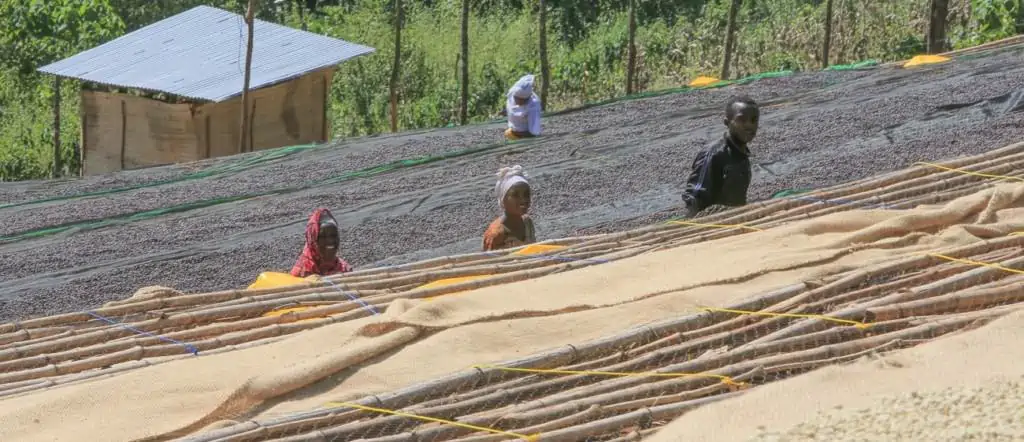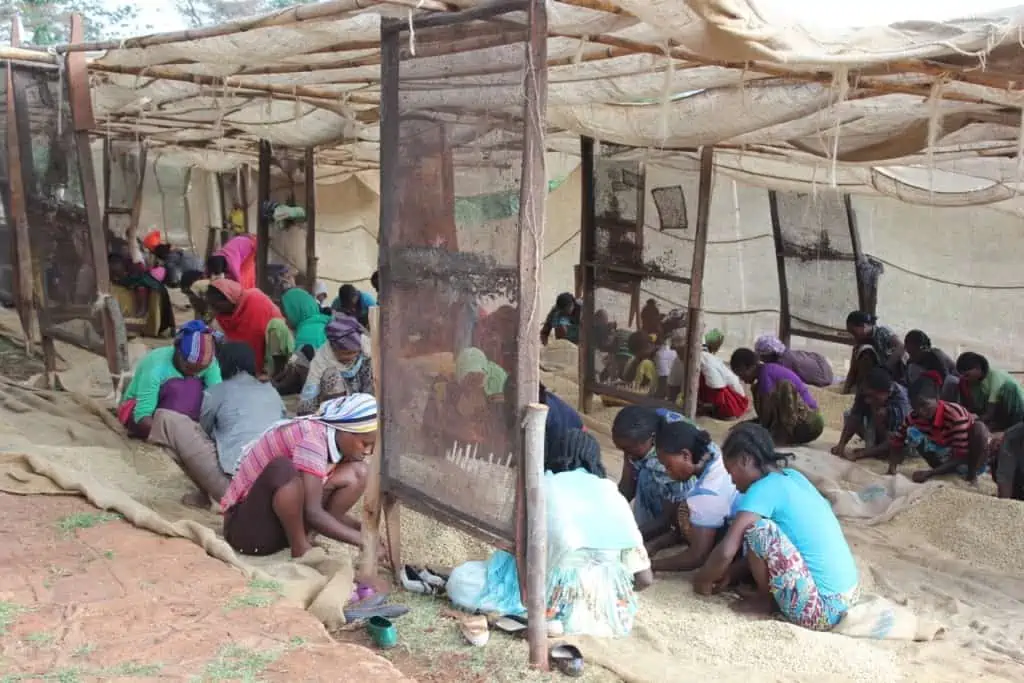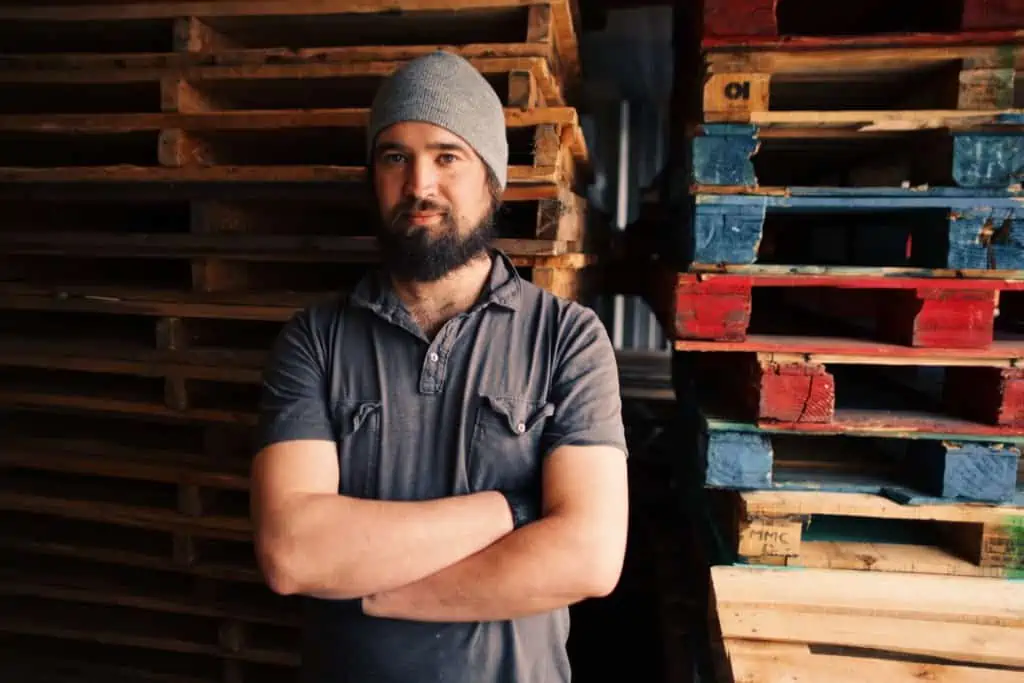
Natural-processed coffee drying in Ethiopia. Courtesy of Coffee Shrub.
Each year we spotlight local roasters in the U.S. specifically by regional geography, choosing one region of the country to look at in depth. This year, we invited roasters from the Northwest states of Washington, Oregon, Montana, Idaho and Wyoming to submit coffees for a blind cupping, and we report here on the nine top-scoring entries.
In many ways, the Northwestern U.S. was the birthplace of contemporary coffee culture in the States. Now ubiquitous Starbucks was founded in Seattle, Washington in 1971. The company popularized new coffee ideas innovated in San Francisco and other cities, ideas central to what we now call specialty coffee: foregrounding the sourcing of green coffees by country and region, roasting to order, and the leisurely enjoyment of high-quality coffee in cafés. Starbucks packaged these ideas and popularized them throughout the U.S. and, eventually, throughout the world. The coffee is extremely dark-roasted by today’s specialty coffee standards; that, too, became a hallmark of Starbucks’ brand. Over time, Starbucks’ aggressive growth, worldwide presence, and monolithic scale have made the company a natural corporate foil to small, local, independent coffee roasters and cafés.
But local specialty roasters and cafés persevered, and they are now the trendsetters, the community hubs, the cultural glue of the American coffee scene. Look no further than Instagram for visual evidence of this — simply search #localcoffee for hundreds of thousands of photos of local coffee communities in their element.
The Coffees We Cupped
Of the 40 coffees we cupped for this report, 20 submissions came from Washington, nine from Montana, seven from Oregon, two from Wyoming, and two from Idaho. Coincidentally, this report comes at a time when much of the U.S. is quarantined, on voluntary or mandatory lockdown to flatten the statistical curve of COVD-19, the novel coronavirus that has become a pandemic.
When we started cupping coffees as they arrived, the Bay Area (where Coffee Review is based) had not yet gotten mandatory shelter-in-place orders. But toward the end of the cupping period, when coffees were still trickling in, we had to pivot quickly and move to a system of remote cupping, which we continue as this report goes live. It isn’t easy, but it works — I check the mail daily (wearing a mask and gloves), sanitize the packages and their contents, then weigh out samples for my two colleagues, Ken and Jason. Lastly, I blind-number each sample (just as we do in the lab), and I leave them for my fellow cuppers to pick up later. It’s a contactless transfer system.
Then, the fun begins. We all have what we need for cupping at home: a scale, a good adjustable burr grinder, a temperature-controlled gooseneck kettle, and lots of cupping glasses. We all follow the same test protocols as we do at the lab. We typically write notes out by hand, but now we transfer them to remote cupping score sheets online. When there are score discrepancies that can’t be solved by the written notes, we discuss by phone or email and settle on a score, much the same way we do in person.
Ratings and Geography
The nine coffees that rose to the top, and that we review here, ranged in score from 92-96; 12 more scored 90 or 91, meaning that more than half of the submissions scored 90 or higher, an impressive number.

Yirgacheffe Coffee Farmers Cooperative Union. Courtesy of Oliver Stormshak.
Of the top nine, four are from roasters based in Washington, three from Montana, and two from Oregon. Six of the top-scorers are Ethiopia-grown coffees, four of which are classic washed-process; one is a natural-processed coffee and one is “anaerobic,” meaning that it was fermented in a low- or no-oxygen environment. Of the remaining three coffees, one is from Kenya, one from Rwanda, and one from Democratic Republic of the Congo. Each expresses its origin and its roaster’s aesthetic in various ways that impressed us.
The Top-Scoring Coffees
We were able to talk with all but one of the roasters of these nine coffees, and we asked them why they chose their particular standout coffees. The process of selecting green coffees to purchase is nuanced and complex. What, for these roasters, was the appeal of these coffees?
Regarding the 96-point Revel Coffee (Billings, Montana) Ethiopia Wush Wush, the one experimentally processed coffee reviewed here, owner-roaster Gary Thiesen says this was an “ugly duckling” green coffee owing to its odd, irregular appearance and unusual method of processing — it was fermented for 120 hours in a virtually oxygen-free environment, resulting in a levitatingly high-toned, uniquely fruity and savory, downright exotic cup. Wush Wush is one of only a few of the many unique indigenous coffee varieties grown in Ethiopia that is processed and sold separately by specific variety name, rather than as part of an anonymous pool of varieties.
Coming in at 94 is the classic-profile Ethiopia Hassen Ware Akrabi, roasted by Indaba Coffee in Spokane, Washington. About this coffee, Bobby Enslow, founder and CEO, says, “‘Akrabi’” means ‘coffee trader’ in the Ethiopian language of Amharic, which seems appropriate for a coffee that was traded through the Ethiopia Commodities Exchange (ECX). But unlike ECX lots from the past — stripped of traceability soon after they are obtained — this lot comes with a history. To begin with, we know exactly where it comes from, which was something lacking in coffees purchased through the ECX in previous years. And farmer payments are tracked too.”
Two Ethiopias and a Rwanda at 93
Three coffees scored a solid 93: Olympia Coffee’s (Olympia, Washington) Ethiopia Adame Garbota (washed-process), Tony’s Coffee (Bellingham, Washington) Rwanda Bumbogo, and Fire Ridge’s (Missoula, Montana) Ethiopia Sidama Bombe Natural.

Justin Freeman, lead roaster for Tony’s Coffee. Courtesy of Tony’s Coffee.
Olympia’s co-owner Oliver Stormshak says of his longtime relationship with Adame Garbota’s coffees, “We have been buying Adame Garbota coffee for about 10 years now. We’ve developed a strong relationship with the Yirgacheffe Coffee Farmers Cooperative Union that exports and mills these coffees. And we imported it with full transparency and traceability with Royal Coffee Importers. We travel to Ethiopia multiple times a year; at the end of each harvest, we spend a week cupping through all the lots from Adame Garbota. This lot was Lot # 3, which had been specially prepared and milled to grade 1 by hand-sorting for more refinement. I love this coffee, as it’s a showcase of the process of beautiful Yirgacheffe coffee. Yirgacheffe is known throughout the world to be the most delicately floral coffee, and this lot of Adame Garbota really showcases that side perfectly.”
Kat McCamant is a self-taught 19-year-old roaster in Missoula, Montana, who recently launched Fire Ridge Coffee Roasting with her dad, Tom, selling mostly at their local farmer’s market. Kat says, “I love to bring out the intense fruit and berry flavors of this coffee, and we have a small but devoted group of customers who keep coming back for it. The Sidama Bombe has all the fruity characteristics I love, along with spice notes that come out in a full city roast.”
At the other end of the longevity spectrum, Tony’s Coffee has been in business for more than 45 years. Marketing and design specialist Ryan Russell says of the Rwanda Bumbogo, “While making our Rwanda selections, Bumbogo stood out during a blind cupping with its complex array of fresh fruit and spice notes. The Gakenke District has a well-deserved reputation for excellent coffee, and Bumbogo is a newer washing station [wet mill] that is doing many things right with its processing, and it shows.”
A Kenya, a Congo & Two More Ethiopias at 92
Rounding out the top-scoring nine coffees are four that rated 92: Bluebeard’s (Tacoma, Washington) Ethiopia Danse Mormora, Dapper & Wise’s (Portland, Oregon) Ethiopia Keramo, Ghost Town’s (Bozeman, Montana) Congo Boza and Noble Coffee’s (Ashland, Oregon) Kenya Muiri Estate.
Bluebeard wholesale manager Evan Bridges says of the Ethiopia Danse Mormora, “We love how balanced and approachable this coffee is. Brown sugar gives way to milk chocolate and apricot, while offering a slightly herbaceous finish, like lemon thyme from the garden. Great for batch-brew or pourover options, with enough body to make a fantastic single-origin espresso.”
Jared Rennie, founder and CEO of Noble Coffee Roasting, discusses his company’s approach to green-buying: “In terms of sourcing, our approach at Noble Coffee Roasting is simple. For over a decade now, we’ve been partnering with the world’s most talented producers of certified organic coffees. Since Kenya is a country with such a small amount of organic coffee, it makes our sourcing there pretty easy. As a farm focused on both quality and sustainability, Muiri Estate is a great fit for us. We’ve been buying coffee from the Muigai family off and on since 2015. This harvest, our importer friends at Royal Coffee brought in various lots from Muiri Estate that we were able to sample, and this lot really surprised us with its classic Kenyan complexity but with a more delicate aroma and acidity than many other Kenyans we’ve tried. In short, this is a very approachable Kenyan that just about anyone will love.”
Ghost Town’s Chad Kimm loves the Congo Boza as much for its mission as for its cup profile. He says that, “Owner Marcelline Budza, inspired by her own mother’s resilience, established Rebuild Women’s Hope (RWH) in 2013 along the shores of Idjwi, a large remote island in the middle of Lake Kivu in eastern Congo, with a vision ‘to place women at the center of the integral development of her community’ and that ‘building the hope of women is building the hope of the entire nation.’” Kimm chose this coffee because he wants to partner with organizations investing in famers’ lives in meaningful ways.
We couldn’t reach anyone at Dapper & Wise, but we enjoyed the washed Ethiopia Keramo for its crisply sweet-tart aroma and flavor, characterized by notes of pineapple, baking chocolate and hazelnut.
DIY Ethos in Times of Crisis
Just as we here at Coffee Review have had to creatively adapt our cupping practices to safely conduct business during the pandemic, coffee roasters have taken various approaches to the production, marketing and sales of their goods and services.
Thiesen says that Revel is “doing okay so far,” and adds that “so much of the uncertainty comes from not knowing just how long this situation will last and how deeply it will end up impacting our wholesale partners. It’s been difficult to see just how swiftly and severely this has affected our restaurants, coffee shops and their employees. One thing this has really driven home is that there truly is no such thing as a ‘non-essential worker’ — we all depend on one another. This economic shockwave has yet to hit some, but it will ripple throughout, and hopefully we can get back to our ‘new normal’ soon. In the meantime, folks still want to enjoy great coffees, and they’ll be drinking more at home right now, so we’ve made shipping free on all orders to make that a little bit easier. We’re also looking to share best practices on social media about getting better extractions with brewing equipment at home. It’s a great time to tinker and experiment!”
Brand-new business Fire Ridge Coffee is seeing a dent in its sales, but the father-daughter team remains positive overall because they also own an orchard, so they’re able to shift their attention to that aspect of their business, for now.
Stormshak doesn’t mince words. Olympia Coffee has had to dig deep into its well of collective creativity to push through this time. He says, “COVID-19 is the hardest challenge we have ever faced in business. We have six locations in the Puget Sound region, all seeing a major drop in customers and hours for staff. Mail-order is our godsend — it’s saving jobs for the roasting and production teams, as we sell online direct to our customers around the country. We are offering free shipping on the site, as well as creating a donation coffee for our staff called Tip Jar, an employee-focused coffee that directly supports our baristas and roasters. 100% of proceeds from the sale of each bag of Tip Jar will be placed in a tip pool then dispersed as a bonus for staff members experiencing hardship due to this sudden downturn.”
Bridges of Bluebeard takes a glass-half-full approach, as well. He made the decision early on to close the café for the safety of workers and customers, while the roastery continues production. He says, “We’re grateful for the network of local grocers and wholesale partners who are able to continue reselling our coffee to their customers to brew at home, as we are making efforts to ‘flatten the curve.’ The added benefit of increased online sales has all the expected challenges of working from home, when possible, while at the same time expanding our shipping and local delivery logistics. We are also grateful to be an essential part of the food supply chain and a joyful part of so many people’s lives every morning. We are a scrappy group of people and part of a resilient community that has a tendency to find creative solutions to problems as they arise. We look forward to seeing our way through this pandemic with some help and relief from our local and federal government, alongside our friends and family who continue to support us by doing the things they always have, shifting their weekly purchases to an online experience, until the time comes when we can share an espresso face to face again.”
Readers, lovers of coffee — please support coffee roasters in your own local area. Look for them on social media to see what their status is, what specials they are advertising, and ways you can help the larger coffee community, which is struggling mightily now. We are also tracking roasters’ stories all around the U.S., so follow our Instagram page @coffeereview for daily updates.
Be well, stay home, flatten the curve, and continue to drink great coffee.










